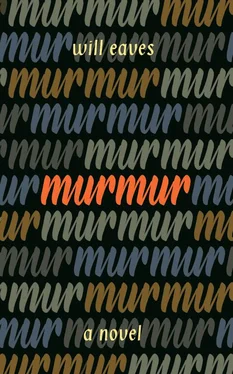We’d entertain each other’s thoughts, not each other. Be many, one, and none. Look now, look there . (The scientist has left the car park and walked over to the library café.) Two people at a table, together, each on the phone to someone else. The physically present companion incidental to the real contact. The sign, you see, is contradictory: those people on the phone are saying, “Yes, I know exactly what you mean,” but there is no distinction between you and you , between an electronic echo and the occupant of space. And this is what it will look like, to begin with—a sort of ecstatic, immediate empathy ( I know exactly what you mean ) increasingly detached from any one person’s presence. You will see more and more people perplexed, distressed, distracted by the men and women they are with, people they love, preferring to take calls or messages from friends or strangers who are elsewhere, and so full of potential.
And now the scientist is sick. He’s made it to the lab, where his assistant has prepared a paper for a peer-reviewed journal on what he calls the “sympathetic valency of brain function in hives.” They work on trauma, neuronal recovery, and shared intelligence. He’s guided to a chair he’s startled in his swoon to recognize as a refuge. A chair is what he needs. Safety. And from the chair he falls onto his knees, all fours. He tries to speak, to say what’s happening, what’s happened to him in the past two hours. The poor assistant, with his hand upon the scientist’s wet back, asks him questions. “Are you OK? Should you be lying down?” He goes off and the scientist can hear him running down the corridor.
He rolls over, looks out along the carpet tiles toward a huge window. The room is dark, the window bright, and through the glass the stricken researcher sees deep into a complex green: the beeches from another vantage point, shifting dynamically, hidden birds’ eyes taxed with their subroutines of grooming, sex, and predation.
Is that a magpie or a jay? Its puppet head confronts the scientist. It looks without seeing, alert. Its vision is a corvid mystery of weak interpretation and associated forms. “Oh God.” He wants to say it’s all so clear: the borders of the self. Forget the hives, for now at least. He knows in one exploded moment why his wife flinches when he comes just that bit too near, and why his fear charges the air. Why she shivers, wondering perhaps if this is what she really wants.
“Don’t try to speak.” The kind assistant is raw-linen-faced, holding his hand, wiping away the froth he cannot feel from his slack lip. “The ambulance is on its way. Try to conserve your energy. I’m here. Alec, it’s me, Julius. Just breathe.”
He breathes into a point of infinite and traceless pain. He stares hard at a carpet tile that’s come unstuck and wants to say: It isn’t knowing what another person thinks or feels that makes us who we are. It’s the respect for not knowing.
We are consoled by someone’s efforts to conceive us, and that effort’s keen shortfall. We are unreachable. A shared mind has no self-knowledge. A field awareness cannot be unique or self-conceal: it has no privacy of mind .
“That’s it. Try to conserve your energy.”
The people in the café, all the endlessly communicating lovers who don’t talk, are in the first throes of becoming field and finding privacy of mind unbearable. An irritant. They do not like their single form. They must be able to be got at, all the time. Unpenetrated bodies disturb them. Are separate. Sex is a salve, partly mechanical, to join what can’t be joined. And feelings, what of them? Where will they go? (Outside, the leaf-veiled corvid’s beak opens. A signal light enters its eyes. The cable lying on the tile uncoils. A plug rises, hissing, and strikes the hand that wired it.) They will be put away, feelings. They will be stored, removed from the body, given profiles in sanctuary—a part of field that doesn’t have to impede field from being everywhere, ideally bodiless. And this is what I now see, what I now predict. The shared mind and machine field must be lesser things, a lower-order consciousness, because they can’t help but connect. The higher-order consciousness, of which our private thought process and yearning are a part, implies a disconnection from the group.
The heart must be broken, the mind cut off behind a look, its feelings and its godlike intuition trapped, or else it has no heart. It is no mind.
I am a thinking reflection. He is the animal-organic part, the body unthinking. I am a searching mechanism with a soul. I’m him, but only when he’s near the glass, metal, water, the surface where I’m found. I search for some way to express this separation that feels all the wrong way round.
A bird is puzzled by its reflection; not, surely, the reflection by the bird. And yet I’m one with him. I’m one, and separate. I search for ways to describe this. I live and think within all glass. He only has a body and can’t hear this murmuring; sees himself in a mirror—doesn’t know that it is me.
Nothing will be the same again. No two things are. Equivalences lie: x , y are not y , x , because the order is reversed, the flow and spin. The same answers given in different rooms. The parroted, the meant. Capacity to want, desire. The star-tipped torchlight waving overhead, the torchlit star.
*
Dear Alec,
You are a tease. Perhaps your man is from the future? I have heard that dreams are p- and t-reversed: they mean the opposite of what they show, and are all effect in anticipation of cause! So perhaps he is not terrified and a prisoner: he bodes well! Have you considered? It is delightful that he comes to you in a mirror, since I do not believe I have ever caught you looking in one, except to lose patience with a tie.
What is the probability of A, who abhors mirrors, being contacted by p-A, who appears in one and cannot exist without it?
You always spare me your pain, dear Alec. But are you well enough?
I can’t quite resist a remark about your solitary virtue. You are wrong about relationships, I think, because you have not taken our species’ adaptability into account. An odd omission, I think you’ll be forced to agree. M. Baudelaire is quite right in all that he says about the inner life, though he does not complete his derivation of proof viz. lonely thinkers and bustling crowds.
The crowd is the complete set of boring demands made on a loved friend, A, or his loving friend, J. But A and J, in mental seclusion, in the middle of the crowd, are indeed free of it, and having a lovely time!
Darling, time turns out to be infinitely expandable. The more I do of the awful drudgery (and it is fairly awful, I admit), the more I find myself thinking of the real work I still want to do and coming to a strange conclusion. The thinking is the work, and the trick is to catch it on the wing, while one does the washing-up or ironing. Or, in your case, while you attend appointments and meetings with your hoodoo Freudian. To be serious, what I mean is, we are creatures, you and I, of salutary distraction. I love Bill, but he has no understanding of a very important part of me. When he is chatting, I am thinking, solving puzzles, fretting. And yet, his conversation is so important, because in the kindest way it sends me back into myself. I could not be reminded of myself without his chatter. Let the set of demands on A, or his friend J, be like the man in the mirror: a mysterious liberation. Oh, let it, darling, for all our sakes.
I do believe he is trying to tell you something.
Your other friend, for aye, June
PS Trentham’s field awareness: I wasn’t aware of it. Send it? Send him?
It is always possible for the computer to break off from his work, to go away and forget all about it, and later to come back and go on with it. If he does this he must leave a note of instructions (written in some standard form) explaining how the work is to be continued.
Читать дальше












